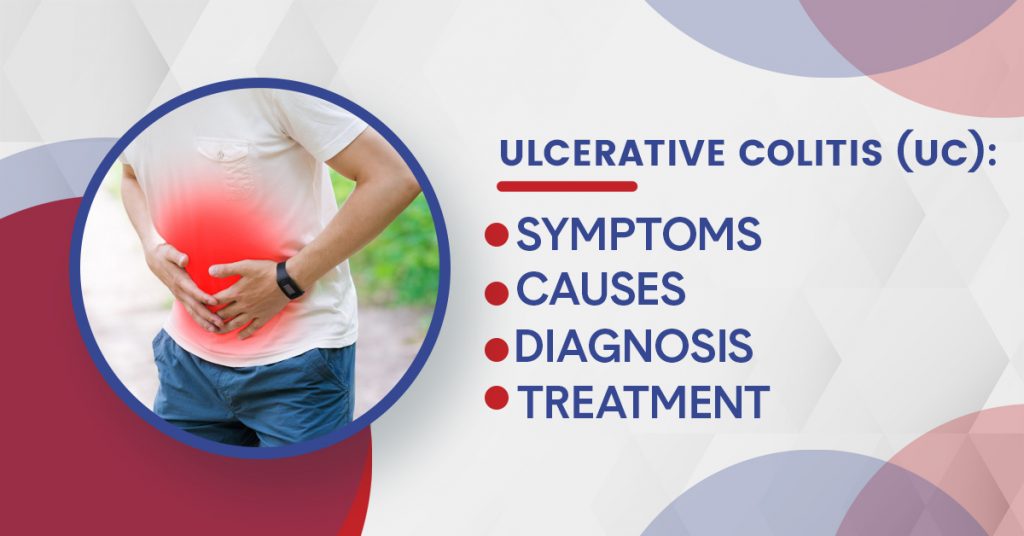What Is Ulcerative Colitis?
Large intestine ulcers, or ulcerative colitis (UC), are caused by irritation and inflammation in the large intestine. The condition is part of the inflammatory bowel disease (IBD) group. Symptoms include diarrhea, cramping, and urgency.
These symptoms can also wake you up in the middle of the night to use the bathroom. Inflammation and location determine the severity of UC. Each person experiences it differently.
Depending on the size of the colon (large area) or how severe the inflammation is, you could have severe inflammation in the rectum (small area). Approximately half of all ulcerative colitis patients have mild symptoms.
In most cases, ulcerative colitis begins between the ages of 15 and 30, and significantly less frequently between the ages of 50 and 70. Women and men are equally affected.
It appears to run in families, with up to 20 percent of people with ulcerative colitis or Crohn’s disease having family members with the disease. About 20% of children are diagnosed with it before the age of 20 and it can even occur in toddlers.
Ulcerative Colitis Symptoms:
People who suffer from UC have different levels of severity of their symptoms. Over time, the symptoms may also change.
There can be periods when individuals with UC experience mild symptoms or none at all. Such periods are known as remissions. The symptoms may return, however, and they may be severe. The condition is called a flare-up.
The most common symptoms of ulcerative colitis include:
- Diarrhea
- Abdominal pain
- Weight loss
- Increased abdominal sounds
- Bloody stools
- Fever
- Rectal pain
- Malnutrition
Additional symptoms of ulcerative colitis include:
- Mouth sores
- Skin problems
- Joint pain
- Joint swelling
- Nausea
- Decreased appetite
- Eye inflammation
Ulcerative Colitis Causes:
In the medical community, the mechanisms behind autoimmune diseases aren’t fully understood, and ulcerative colitis is also not fully understood. There is growing evidence that genetic and environmental factors play a role in the development of UC.
- Genetic causes: Some families seem to be affected by ulcerative colitis. UC is thought to be caused by variations in genes, but researchers aren’t certain how these differences are linked directly.
- Overactive intestinal immune system: The immune system deals with viruses, bacteria, and other harmful invaders. Scientists believe these invaders could confuse the immune system, causing the body to launch an inflammatory response against the large intestine, causing UC.
- Environmental causes: The majority of research suggests environmental factors may increase the chance of ulcerative colitis, but those risks are considered low. People with heavy diets may be more susceptible to ulcerative colitis. Some people find that certain foods trigger a reaction in them. Some drugs may also increase the risk. These drugs include aspirin, ibuprofen, naproxen, etc.
- Emotional stress: There is no evidence to suggest emotional stress causes ulcerative colitis. There is some evidence that it can trigger a flare-up after some people develop UC.
Ulcerative Colitis Risk Factors:
Some risk factors of ulcerative colitis are as follows:
- Age: The onset of ulcerative colitis can occur at any age, but it is more prevalent in adults between 15 and 30 of age.
- Ethnicity: Ethnic whites and those of Ashkenazi Jewish descent are at higher risk of the diagnosis.
- Genetics: Recent studies have identified specific genes that may be involved in ulcerative colitis, but the link between the genes and the disease remains uncertain due to environmental factors.
Types of Ulcerative Colitis:
A patient with ulcerative colitis can be classified based on how severe it is or where it is located in the body. Different types of ulcerative colitis are characterized by different symptoms.
- Ulcerative Proctitis: This is the mild form of UC. The problem only affects the rectum and the only symptom is rectal bleeding.
- Proctosigmoiditis: An individual suffering from this type of cancer will suffer from lower-end colon cancer and rectum cancer. Abdominal cramps and bleeding diarrhea characterize this type of cancer.
- Left-sided colitis: This type causes cramps in the rectum and the lower colon on the left side of the abdomen. It may also cause weight loss and bloody diarrhea.
- Pancolitis: It consists of a number of symptoms including diarrhea, weight loss, abdominal cramps, pain, fatigue, and fatigue, and can affect the entire colon.
- Acute severe ulcerative colitis: It is rare but can result in bloody diarrhea, a high fever, and pain in the colon.
Ulcerative Colitis Diagnosis:
Various tests are available to diagnose ulcerative colitis, some of them are listed below here:
- Blood test: Tests of the blood are often helpful in diagnosing UC. Complete blood counts are used to detecting anemia (low levels of red blood cells). Inflammatory markers like a high C-reactive protein level and a high sedimentation rate may indicate that the patient is undergoing treatment. Specialized antibody tests may be ordered as well.
- Stool test: It is important to have your stool examined by a doctor for certain inflammation markers, blood, bacteria, and parasites.
- CT scan: CT scan will capture the X-Ray of your pelvis and abdomen.
- Endoscopy: Doctors use a flexible tube to examine the esophagus, stomach, and small intestine.
- Biopsy: A tissue has been removed in this process for analysis.
- Flexible sigmoidoscopy: It is a type of endoscopy. Doctors insert a long, flexible tube into your rectum in order to examine this area, the sigmoid colon, and a portion of the descending colon. In addition to sigmoidoscopy, flexible sigmoidoscopy is sometimes called sigmoidoscopy.
- Colonoscopy: In a colonoscopy, a doctor inserts a lighted instrument called a colonoscope to observe the inside of the colon. It is a type of endoscopy as well.
Ulcerative Colitis Treatment:
Surgery, dietary changes, or medicine can all be used to treat ulcerative colitis. You can ease the symptoms of ulcerative colitis with these treatments unless you have surgery to remove your rectum and colon, which is considered curative.
You should seek treatment as soon as you have symptoms of ulcerative colitis. To prevent or treat dehydration, reduce your symptoms, and make sure you’re getting the right nutrition, you may need to visit the hospital if you experience severe diarrhea and bleeding.
Medications:
If you have inflammation in your bowel, your doctor may recommend several types of medications, including sulfa drugs, corticosteroids, immunosuppressive medications, and antibiotics.
Aminosalicylates, drugs related to aspirin, are the most experienced inflammation-reducing drugs. In the case of ineffective aminosalicylates, corticosteroids (such as prednisone) are used.
Immunomodulation is also a drug that reduces the immune response thereby reducing inflammation. For the drugs to be maximally effective, it can take several weeks to months. The immune system produces proteins that biologics target.
Biologic Therapies:
Biologic therapy is an innovative treatment for ulcerative colitis. In biological therapy, antibodies are used to attack molecules produced by the immune system and cause inflammation.
Among biologic agents, tumor necrosis factor is directed against the immune system’s production of a protein. Patients are given the antibodies intravenously several times a year.
Whipworm Therapy:
A fascinating observation is a possibility that infection with the pig whipworm may be an effective treatment for ulcerative colitis. The worms that inhabit the colon are believed to reduce inflammation by altering the immune system.
After ingesting pig whipworm eggs for 12 weeks, 43% of ulcerative colitis patients reported improvement. In developing countries where intestinal parasites are common, ulcerative colitis was not common, thus the impetus for investigating whipworm treatment.
Surgery for Ulcerative Colitis:
Ulcerative colitis can be cured with surgery, which involves the removal of your colon and rectum (proctocolectomy).
The procedure is typically associated with a procedure known as ileoanastomosis (J-pouch) surgery. By doing so, no bag is needed for collecting stool. During surgery, your surgeon makes a pouch from the end of your small intestine. You’re then able to expel waste relatively normally after the pouch is attached to your anus.
But in some cases, a pouch may not be an option. An ileal stoma is placed in your abdomen as a permanent opening through which stool can be passed to be collected with an attached bag.
When to See a Doctor
Call your doctor immediately if you have these kinds of symptoms.
- Consistent diarrhea of high severity.
- Having blood clots in your stool due to anus bleeding.
- High fever and constant pain.


